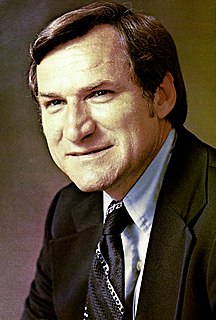A Quote by Bill Hybels
Wise leaders understand that the single greatest determinant of whether followers will ever own a vision deeply is the extent to which whose followers believe the leader will own it.
Related Quotes
Not many of us will be leaders; and even those who are leaders must also be followers much of the time. This is the crucial role. Followers judge leaders. Only if the leaders pass that test do they have any impact. The potential followers, if their judgment is poor, have judged themselves. If the leader takes his or her followers to the goal, to great achievements, it is because the followers were capable of that kind of response.
Trust is perhaps the most critical single building block underlying effectiveness. Without trust leaders do not have followers. Without trust, leaders are impotent despite great rhetoric or splendid ideas. Trust rests on the belief among followers that the leader is transparent: What you see is what there is. Trust means followers believe there is no duplicity; no manipulation just to satisfy the leader's ego. Very simply: The effective leader is transparent; that's why that person is trusted.
Moral authority is another way to define servant leadership because it represents a reciprocal choice between leader and follower. If the leader is principle centered, he or she will develop moral authority. If the follower is principle centered, he or she will follow the leader. In this sense, both leaders and followers are followers. Why? They follow truth. They follow natural law. They follow principles. They follow a common, agreed-upon vision. They share values. They grow to trust one another.
All authority of any kind, especially in the field of thought and understanding, is the most destructive, evil thing. Leaders destroy the followers and followers destroy the leaders. You have to be your own teacher and your own disciple. You have to question everything that man has accepted as valuable, as necessary.
Followers are always watching what you do. And people do what people see! If you are a leader seeking to make your vision come alive, then there is no better way to accomplish this than by living it: Modeling your expectations, setting the example by your actions, and showing the way through leading. Your followers, who are watching, will see in you the living picture of the vision, and you will produce the energy, motivation and passion to keep it going.
Often, in a given project team or network, one sees leadership roles shifting among various members at various times. Attempts to fit these into traditional views of "leader" and "follower" don't quite work. It's more like Twitter: the "leader" has "followers" - but the "followers" are empowered to alter the relationship unilaterally, and the "leader" must continually earn the consent of the "followers."
In order to be a leader a man must have followers. And to have followers, a man must have their confidence. Hence, the supreme quality for a leader is unquestionably integrity. Without it, no real success is possible, no matter whether it is on a section gang, a football field, in an army, or in an office. If a man's associates find him guilty of being phony, if they find that he lacks forthright integrity, he will fail. His teachings and actions must square with each other. The first great need, therefore, is integrity and high purpose.
All religious leaders and spiritual teachers emphasize finding a place within us that is true. People who obsessively follow these leaders instead of their own purpose attach to the spiritual leader and become fanatical and controlling. That's why Jesus tried to tell his followers not to get attached to outward form.
































